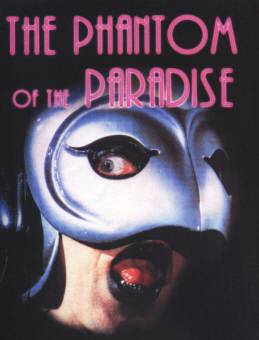
by
Don Kaye
SPRING 2001

Last Updated 25th August
(The following appeared as a 2 part article by Don Kaye in issues #89 and #90 of SHIVER - 'The Magazine Of Horror Entertainment'. The black and white photos were courtesy of Williams Finley, whilst the 'Swan Song' original poster artwork was provided by Don Pressman. The copywrite for the articles are © Visual Imagination Limited 2001 ).
WE LOOK BACK TO BRIAN DE PALMA'S ROCK
REWORKING OF THE PHANTOM OF THE OPERA –
A SHIVERS FEATURE BY DON KAYE
'T WAS THE mid-Seventies when a low-budget, independent film came along that both celebrated and satirized two of pop culture's most beloved staples: rock music and Horror movies. The film borrowed liberally from Horror and Science Fiction classics, predicted the then nascent glam rock scene, and playfully targeted the hedonistic drugs-and-sex lifestyle of the time. A highly stylized Horror rock musical comedy, the film flopped upon its initial release, but in the intervening decades, has found a devoted cult following that keeps its memory alive and well to this day.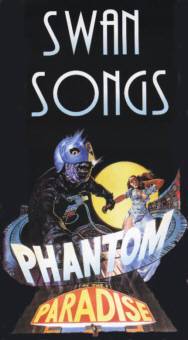 No,
the film in question is not The Rocky Horror Picture Show. It's Phantom of the Paradise,
writer/director Brian De Palma's oddly timeless 1974 spoof that is a distant cousin to the
more popular Rocky, yet, its fans maintain, is the better film. Certainly the two films
share many common elements, the biggest being their rock scores and loving satire of
many of the Horror genre's archetypes. But whereas Rocky never quite rises above its
campy beginnings, Phantom has a sharper, more tragic edge, its satirical jabs are more
pointed, and the end result is ultimately a bit more unsettling. It's also clearly the
work of a truly gifted film-maker who, even at this early stage of his career, was just
beginning to flex his directorial muscles.
No,
the film in question is not The Rocky Horror Picture Show. It's Phantom of the Paradise,
writer/director Brian De Palma's oddly timeless 1974 spoof that is a distant cousin to the
more popular Rocky, yet, its fans maintain, is the better film. Certainly the two films
share many common elements, the biggest being their rock scores and loving satire of
many of the Horror genre's archetypes. But whereas Rocky never quite rises above its
campy beginnings, Phantom has a sharper, more tragic edge, its satirical jabs are more
pointed, and the end result is ultimately a bit more unsettling. It's also clearly the
work of a truly gifted film-maker who, even at this early stage of his career, was just
beginning to flex his directorial muscles. 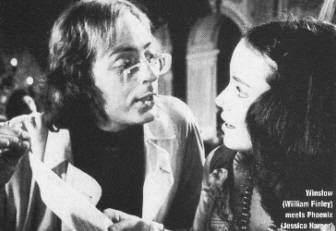 In
kaleidoscopic fashion, Phantom of the Paradise tells the story of Winslow, a naive young
songwriter who comes to the big city to get his massive rock cantata, based on the
legend of Faust recorded. He snags an audition for shadowy rock impresario Swan
(real-life pop singer/songwriter Paul Williams) who, in classic music biz tradition, plots
to steal Winslow's music, alter it, and use it to open his new rock theatre, The Paradise.
Sneaking into Swan's foreboding mansion - where he meets a beautiful young singer named
Phoenix (Suspiria's Jessica Harper in her screen début) - Winslow is beaten by Swan's
thugs, framed, and sent to prison, where his teeth are replaced by stainless steel in a
grotesque 'hygiene' experiment.
In
kaleidoscopic fashion, Phantom of the Paradise tells the story of Winslow, a naive young
songwriter who comes to the big city to get his massive rock cantata, based on the
legend of Faust recorded. He snags an audition for shadowy rock impresario Swan
(real-life pop singer/songwriter Paul Williams) who, in classic music biz tradition, plots
to steal Winslow's music, alter it, and use it to open his new rock theatre, The Paradise.
Sneaking into Swan's foreboding mansion - where he meets a beautiful young singer named
Phoenix (Suspiria's Jessica Harper in her screen début) - Winslow is beaten by Swan's
thugs, framed, and sent to prison, where his teeth are replaced by stainless steel in a
grotesque 'hygiene' experiment.
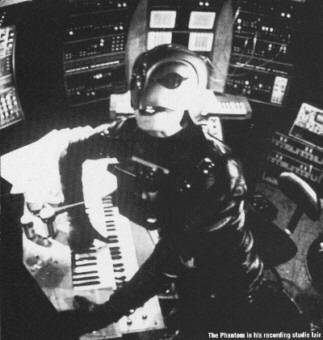 Sabotaging
the rehearsals of Faust, Winslow confronts Swan, who demands that Winslow finish rewriting
the score. Winslow agrees with the stipulation that Phoenix sings the lead, and signs a
contract with Swan in blood. Swan, naturally, has no intention of giving Phoenix the
lead; instead he hires Beef (Gerrit Graham), an androgynous, wildly flamboyant
glam-rocker. The Phantom escapes Swan's studio prison and electrocutes Beef onstage on
opening night; the crowd loves it, and also loves Phoenix, who goes out to sing in his
place. Sensing that he has a new star on his hands, Swan immediately makes diabolical
plans for Phoenix, while the Phantom discovers the true nature of his contract with Swan
and realizes that his Faust is closer to the truth than he could have possibly
imagined.
Sabotaging
the rehearsals of Faust, Winslow confronts Swan, who demands that Winslow finish rewriting
the score. Winslow agrees with the stipulation that Phoenix sings the lead, and signs a
contract with Swan in blood. Swan, naturally, has no intention of giving Phoenix the
lead; instead he hires Beef (Gerrit Graham), an androgynous, wildly flamboyant
glam-rocker. The Phantom escapes Swan's studio prison and electrocutes Beef onstage on
opening night; the crowd loves it, and also loves Phoenix, who goes out to sing in his
place. Sensing that he has a new star on his hands, Swan immediately makes diabolical
plans for Phoenix, while the Phantom discovers the true nature of his contract with Swan
and realizes that his Faust is closer to the truth than he could have possibly
imagined.
FALLING
OUT
BUDGET
CUTS
GREAT
SONGWRITER
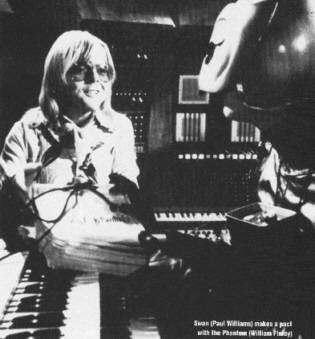 "Paul
wanted to be involved in the movie and be in it as an actor, and the trade-off was that
he'd let Brian and Ed Pressman have the music for very little money," says Gerrit
Graham. "The first part that he chose for himself to play was The Phantom, which
would have meant that I would have played Swan - which was the first part Brian talked to
me about - and that Bill Finley, for whom the part of The Phantom had been written,
would be excluded unless he played Beef. Brian told me at one point that they were
thinking of Peter Boyle for Beef. At some point, however, Paul Williams changed his mind
and decided he'd rather play Swan." William Finley recalls that Jon Voight was
considered for Swan at one point and musical group Sha Na Na were almost The Juicy Fruits!
"Paul
wanted to be involved in the movie and be in it as an actor, and the trade-off was that
he'd let Brian and Ed Pressman have the music for very little money," says Gerrit
Graham. "The first part that he chose for himself to play was The Phantom, which
would have meant that I would have played Swan - which was the first part Brian talked to
me about - and that Bill Finley, for whom the part of The Phantom had been written,
would be excluded unless he played Beef. Brian told me at one point that they were
thinking of Peter Boyle for Beef. At some point, however, Paul Williams changed his mind
and decided he'd rather play Swan." William Finley recalls that Jon Voight was
considered for Swan at one point and musical group Sha Na Na were almost The Juicy Fruits!
TRIAL
BY FIRE
"I
thought the whole idea of recreating Phantom of the Opera in rock terms was a fabulous
one," Harper reflects. "There were so many people who were devoted to making
this little independent picture work. The early Seventies was really the beginning of this
whole group of new directors and new cinema that was just starting to explode, and it was
very exciting to be working with Brian since he was definitely part of that group and
had his own unique vision."
Phantom was shot over the winter of 1973 in New York, on
soundstages in LA, and for the scenes inside the Paradise, at an abandoned theatre in
Dallas called The Majestic.
UNIQUE
IMAGE
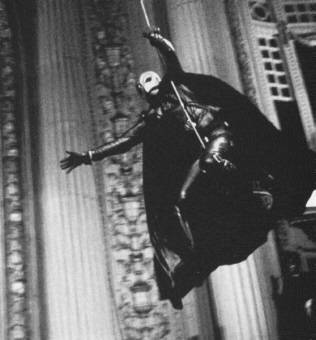 The
Phantom's own thoroughly unique image, recently immortalized in Japan by a 12-inch action
figure, was a collaboration between Finley and costume designer Rosanna Norton.
"I came up with the idea of what the helmet should look like, which was influenced by
the whole bird motif, the whole idea that all these characters were some variety of
bird," says the actor "She realized all these things into really beautiful
costumes, given the budget... I had this idea of what kind of creature the Phantom would
be. I wanted it to be somewhere between a sort of bird of prey and a little bit of an
alien, the notion of a human being transforming into something totally different.
The
Phantom's own thoroughly unique image, recently immortalized in Japan by a 12-inch action
figure, was a collaboration between Finley and costume designer Rosanna Norton.
"I came up with the idea of what the helmet should look like, which was influenced by
the whole bird motif, the whole idea that all these characters were some variety of
bird," says the actor "She realized all these things into really beautiful
costumes, given the budget... I had this idea of what kind of creature the Phantom would
be. I wanted it to be somewhere between a sort of bird of prey and a little bit of an
alien, the notion of a human being transforming into something totally different.
"The
headpiece was hell. I couldn't hear and it was really hard to get directions. Finally we
had a little transmitter that they stuck that in one ear so I could hear. Like the
rooftop scene, which is one of my favourite scenes, the only way that Brian could get
directions to me before the walkie-talkie was to scream at the top of his lungs. With the
rain and lightning, I couldn't hear a damn thing, that's when we decided on the
transmitter."
"I
remember that it was a difficult shoot," says Pressman. "We had a lot of
difficulty keeping on schedule, because it was a very ambitious film for the money we
had. There were a lot of production problems, but not within the creative group... the
scene where the Phantom is watching Swan and Phoenix in bed through the skylight, in the
rain, had to be reshot because it didn't work the first time. So that was a big financial
burden..."
SHOWER
SONGS
Graham's
character only appears in the film for about 15 minutes, but arguably steals that entire
quarter-hour with his outrageous lisp, over-the-top make-up and costumes, and the
indelible image of his electrocution by neon lightning bolt. "At the time, you had to
use code words like 'flamboyant' and ‘eccentric' for gay,” says Graham. "They
wanted the character to be gay, but they didn't want to say so"
GLAM
ROCK
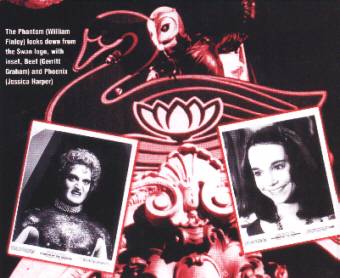 Graham
also asserts that Beef, and The Juicy Fruits' reinvention as The Undead in the film's
second half, anticipated the glitter rock scene: "Within the next year or two, Kiss
appeared with their faces painted like The Undead. In LA, I was taken backstage to meet a
band called the Tubes. Fee Waybill, the lead singer, told me 'I based everything I do on
Beef!'"
Graham
also asserts that Beef, and The Juicy Fruits' reinvention as The Undead in the film's
second half, anticipated the glitter rock scene: "Within the next year or two, Kiss
appeared with their faces painted like The Undead. In LA, I was taken backstage to meet a
band called the Tubes. Fee Waybill, the lead singer, told me 'I based everything I do on
Beef!'"
Besides
commenting on trends that were really happening in rock music at the time, Phantom
collided with the real-life music business in other ways. Aside from the runin with
Bill Graham over the title, “Swan's record company was originally called Swansong
Records,"chuckles Graham. “I remember picking up an issue of Rolling Stone and
seeing a story about how Led Zeppelin and their very scary manager, Peter Grant, had just
started a record company called Swansong Records. I showed it to Ed and said, 'don't you
think this is gonna be a problem?' and he said, 'nah, don't worry about it.'
But now, anywhere that Swansong appears in the film, it's been hand-painted out of every
frame!"
MIXED
RECEPTION
"We did a new campaign with a new poster that Richard
Corben did, created our own TV spots and trailer that were directed by Jack Sholder (The
Hidden), and we started in either Little Rock, Arkansas, or El Paso, Texas. We went into
both eventually. We tried out a campaign in both cities with pretty heavy television,
because they were small cities and television didn't cost as much. And it did great. The
reviews were good, the whole film took on a new life."
SUCCESS
AT LAST
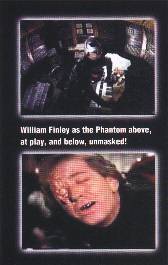 Indeed,
that second run proved worthwhile, although the film hardly established the same
large-scale following as Fox stable-mate Rocky Horror. Outside the US, however, the
results were somewhat different. "I began to realize that it was not a success
here, and began to appreciate the places where it was a success" muses Williams,
whose score received an Oscar nomination, but lost to The Great Gatsby. "It ran in
Paris for 12 years or something (18, according to Pressman), it was huge in Canada - we
wound up getting a gold record for the soundtrack from Canada, for the sales from Winnipeg
alone!”
Indeed,
that second run proved worthwhile, although the film hardly established the same
large-scale following as Fox stable-mate Rocky Horror. Outside the US, however, the
results were somewhat different. "I began to realize that it was not a success
here, and began to appreciate the places where it was a success" muses Williams,
whose score received an Oscar nomination, but lost to The Great Gatsby. "It ran in
Paris for 12 years or something (18, according to Pressman), it was huge in Canada - we
wound up getting a gold record for the soundtrack from Canada, for the sales from Winnipeg
alone!”
"Nowadays
there is a cult following. The people who love Phantom really love it, and we're really
touched. I've met people in the business who tell me that their first real scare was
Phantom which is funny, because I don't think of it as frightening."
Although
Phantom of the Paradise isn't strictly a Horror film, Paul Williams suggests that one
satirical aspect of the plot is a grim reality in modern times. "The heart of the picture
for me is one line, when I'm standing in the stairwell and Philbin asks me, 'I can
understand you wanting to kill her, but why with the whole world watching?' And I say, 'An assassination live on coast-to-coast television
- that's entertainment!' I love the idea there is this theatrical violence and the
kids think it's part of the show."
"I
did not realize its resonance until recently, when I learned a lot of things that I never
knew, like the cult following and the Internet life in which people are talking about
this movie," says Pressman, who, along with Finley and Graham attended a screening
of the film in New York last February as part of a retrospective of his work. "I
thought it was forgotten here I was pleased to see that there was still a following, and
even more pleased to see how welt it played."
QUEEN
JESSICA!
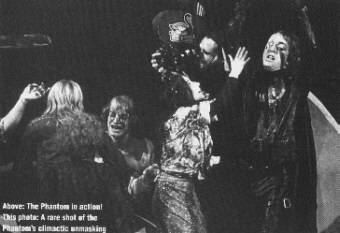 "I
just have a special feeling about that movie," says Harper, whose later roles in
films like Dano Argento's classic Suspiria (and, ironically, Shock Treatment, the Rocky
Horror sequel) has earned her the unofficial title of 'Queen of Cult movies'. "And
proud of it!" laughs the actress, who spends most of her time these days working on
children's books and records “It's better to be the queen of cult movies than to not be
the queen of anything. I think cult movies are some of the best movies, so it's okay with
me."
"I
just have a special feeling about that movie," says Harper, whose later roles in
films like Dano Argento's classic Suspiria (and, ironically, Shock Treatment, the Rocky
Horror sequel) has earned her the unofficial title of 'Queen of Cult movies'. "And
proud of it!" laughs the actress, who spends most of her time these days working on
children's books and records “It's better to be the queen of cult movies than to not be
the queen of anything. I think cult movies are some of the best movies, so it's okay with
me."
There's
a small, but devoted, legion of Phantom of the Paradise fans, who, 25 years after the
'other' Horror rock musical was released, would say the same thing.
From
SHIVERS #89 & #90 – The Magazine Of Horror Entertainment
© Visual Imagination Limited 2001
- What's It All About? - My Review Of The "Phantom Of The Paradise" Album
- Sleeve Notes From "Phantom Of The Paradise"
- Interview (Dated 1975) with Brian DePalma, The Director of "Phantom Of The Paradise"
- The 'Lost' Tracks From "Phantom Of The Paradise"
- Paul Plays Piano In "Phantom Of The Paradise"
- Where To Get The Sheet Music For "Phantom Of The Paradise"
- See Pictures Of Paul Williams As Swan In The "Swan Picture Gallery"
- List Of Other Web Pages About 'Phantom Of The
Paradise'
Hear some rather fun (and rather short) extracts from
'Phantom Of The Paradise' in "The Daily .Wav"
(Thanks to Sarah for telling me about this page)
 Return to Paul Williams Music and Acting Home Page
Return to Paul Williams Music and Acting Home PageEmail me, David Chamberlayne, at:
Phantom@paulwilliams.co.uk